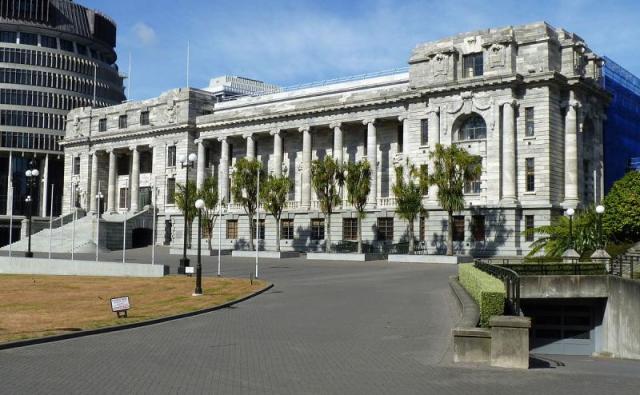Submissions open on bill proposing amendments to the Films, Videos, and Publications Classification Act
Thu 04 Mar 2021
Submissions are open on the Films, Videos, and Publications Classification (Urgent Interim Classification of Publications and Prevention of Online Harm) Amendment Bill. The deadline to make a submission is 1 April 2021.

The Governance and Administration Committee is calling for submissions on the Films, Videos, and Publications Classification (Urgent Interim Classification of Publications and Prevention of Online Harm) Amendment Bill.
The deadline to make a submission is 1 April 2021.
This bill will update the Films, Videos, and Publications Classification Act 1993 to allow for urgent prevention and mitigation of harms caused by objectionable publications. It would:
- "make livestreaming of objectionable content a criminal offence
- enable the Chief Censor to issue time-limited interim classification assessments of publications
- allow the issuing of take-down notices for objectionable online content
- subject online content hosts to a civil pecuniary penalty if they do not comply with an issued take-down notice
- facilitate the set up of future mechanisms for blocking or filtering objectionable online content."
The Act regulates how films, games and other publications (including digital content) are classified and governs censorship in New Zealand. Under the Act, it is an offence to make, possess, supply or distribute objectionable material. The Act also allows the Classification Office, an independent Crown entity, to restrict or ban any 'publication'. The purpose of the classification system is to prevent harm to the New Zealand public by restricting the availability of publications containing harmful material.
Section 3 of the Act outlines what can be considered objectionable "...if it describes, depicts, expresses, or otherwise deals with matters such as sex, horror, crime, cruelty, or violence in such a manner that the availability of the publication is likely to be injurious to the public good." This includes sexual violence, child exploitation, torture and extreme violence. Under Section 3, it specifically states:
"(2) A publication shall be deemed to be objectionable for the purposes of this Act if the publication promotes or supports, or tends to promote or support,—
(a) the exploitation of children, or young persons, or both, for sexual purposes; or
(b) the use of violence or coercion to compel any person to participate in, or submit to, sexual conduct; or
(c) sexual conduct with or upon the body of a dead person; or
(d) the use of urine or excrement in association with degrading or dehumanising conduct or sexual conduct; or
(e) bestiality; or
(f) acts of torture or the infliction of extreme violence or extreme cruelty.
(3) In determining, for the purposes of this Act, whether or not any publication (other than a publication to which subsection (2) applies) is objectionable or should in accordance with section 23(2) be given a classification other than objectionable, particular weight shall be given to the extent and degree to which, and the manner in which, the publication—
(a) describes, depicts, or otherwise deals with—
(i) acts of torture, the infliction of serious physical harm, or acts of significant cruelty:
(ii) sexual violence or sexual coercion, or violence or coercion in association with sexual conduct:
(iii) other sexual or physical conduct of a degrading or dehumanising or demeaning nature:
(iv) sexual conduct with or by children, or young persons, or both:
(v) physical conduct in which sexual satisfaction is derived from inflicting or suffering cruelty or pain:
(b) exploits the nudity of children, or young persons, or both:
(c) degrades or dehumanises or demeans any person:
(d) promotes or encourages criminal acts or acts of terrorism:
(e) represents (whether directly or by implication) that members of any particular class of the public are inherently inferior to other members of the public by reason of any characteristic of members of that class, being a characteristic that is a prohibited ground of discrimination specified in section 21(1) of the Human Rights Act 1993."
The bill was introduced in May 2020 as part of the government programme to address violent extremism in response to the terrorist attack on Christchurch masjidain. Media outlet Newsroom published an article providing an overview of the major provisions of the legislation when it was introduced. For more background information also see the Classification Office response to the March 2019 Christchurch terrorist attack, livestream and manifesto.
Update: In September 2021 the select committee submitted their report to parliament on the proposed legislation recommending that it be passed with amendments. The Bill received Royal Assent in November 2021 and became Law in February 2022.
Related news
Update: TeLENZ (Technology in Legal Education for New Zealand) is hosting a webinar on Unauthorised Posting of Intimate Visual Recording on 19 March 2021. The panel includes Louisa Wall, CEO of Netsafe Martin Cocker, and researcher Paulette Benton-Greig. The panel will discuss the Parliamentary Member's bill, Harmful Digital Communications (Unauthorised Posting of Intimate Visual Recording) Amendment Bill and the related issues. The bill was introduced in July 2020 and proposes to make it an offence for a person to post a digital communication comprising intimate visual recordings of another person. The bill has been referred to the Justice select committee as of March 2021.
The Harmful Digital Communications Act 2015 provides protections for individuals from online content that causes harm, such as online bullying, harassment, image based abuse and other forms of abuse and intimidation. It includes both civil and criminal provisions. In March 2019, media reported that the Harmful Digital Communications Act was under review. In July 2020 media reported the Act was still under review but the review had been delayed.
Part 9, Chapter 4 of the final report from the Royal Commission of Inquiry into the terrorist attack on Christchurch masjidain looks at areas for improvement in New Zealand's legal framework and Police practice to address hate crime and hate speech. The Royal Commission also published a paper about the concepts of hate speech and hate crime, New Zealand’s current laws and proposals for change. In December 2020, the Government announced initiatives in response to the final report from the Royal Commission. This includes changes to legislation related to hate speech.
The Human Rights Commission previously published Kōrero Whakamauāhara: Hate Speech - An overview of the current legal framework (December 2019). Netsafe previously published reports on online hate speech in December 2019.
The Second National Survey of Technology Abuse and Domestic Violence in Australia (November 2020) found significant increases in technology based domestic violence over the past five years. For additional research search our library under technology abuse.
Related media
Battle against online harm beefs up censor's power, RNZ, 21.03.2021
Controversial internet filtering law may be overhauled, Newsroom, 25.02.2021
Legal offence for livestreaming objectionable content considered by govt, RNZ, 12.02.2021
Censorship in 2020: Tiger King, terrorism and the death of the video tape, Stuff, 28.12.2020
Policing hate: What are the proposed changes and will they make a difference?, Stuff, 12.12.2020
Where are our hate speech laws?, The Spinoff, 28.08.2020
The Government wants to filter the internet. Is that a good idea?, Stuff, 24.07.2020
Heads butt over new bill’s internet powers, Newsroom, 29.05.2020
Image: Wikimedia




